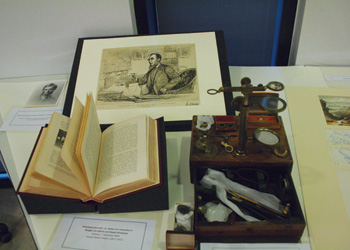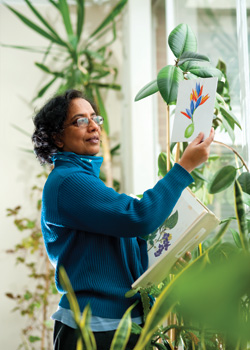Digitising botanical archives to inform modern biological, environmental and climate research
A wealth of botanical and environmental knowledge, collected by pioneering explorers from the 17th to the 19th centuries, is housed in fragile and sometimes endangered archives in museums and botanical gardens around the world.
 Items from the Joseph Dalton Hooker archive held at the Royal Botanic Gardens, Kew
Items from the Joseph Dalton Hooker archive held at the Royal Botanic Gardens, Kew
Sussex's Centre for World Environmental History
The Centre for World Environmental History at Sussex is working with partners to transcribe, collate and digitise archives to preserve them and to make them more accessible to researchers.
Over the course of its history, the outreaches of the British Empire acted as laboratories for the development of botany and environmentalism, with extensive and systematic record-keeping on biological, climate and cultural data, and the collection of botanical and geological specimens, much of which work helped form the basis of the modern scientific method.
The records, specimens, journals and correspondence of colonial officials, surveyors, doctors and natural historians from the 1600s onwards formed a global but fragmented archive of information that has great potential in informing modern history, science and climate study.
Digitising these vast and dispersed records, housed in museums and botanical archives around the world, amounts to an enormous collective effort for historians and scientists alike.
Sussex's Centre for World Environmental History specialises in the environmental history of the tropics, and fosters interdisciplinary and interinstitutional collaborations that cross the boundaries of the social sciences, humanities, and the history of science.
A goal of the Centre is to facilitate projects that allow the use of information housed in such historical archives to its full potential.
One ongoing project, led by Dr Vinita Damodaran, Director of the Centre and Senior Lecturer in South Asian History at Sussex, involves the transcription of part of the correspondence of Joseph Dalton Hooker (1817-1911), Director of the Royal Botanic Gardens, Kew from 1865 to 1885.
This correspondence, specifically from his Himalayan expedition (1847-1851) forms part of a larger collection of his writings and herbarium, housed in the economic botany collection at Kew, and includes letters to other scientists such as Charles Darwin, Nathaniel Wallich and George Bentham, as well as to his father William Hooker (the then Director of Kew) and female relatives.
The correspondence contains a wealth of information on botanical, geological and ethnographic observations from his expedition.
From paper to code
Analysis of these historical records presents certain difficulties to modern researchers.
Thus, a large part of the pilot stage of the project, carried out by the transcription team (Drs Anna Winterbottom, Lowell Woodcock and Kristopher Grint), involved developing a schema to digitise, transcribe and mark up the text to make it useful to a community of diverse users.
Following xml standards defined by the Text Encoding Initiative (TEI), the team spent a significant amount of time designing and modifying the schema to account for features specific to these documents and to ensure that the text is adequately marked up and usable.
The use of archaic and colloquial botanical terminology, phonetic spellings for indigenous plant names and features, and the use of Victorian Anglo-Indian jargon all required specific notation to make the documents searchable and comprehensible to modern readers.
An additional challenge in working with such old and fragile documents is presented by the physical condition of the material, with text often being obscured or difficult to read due to the binding, the variable quality of the ink, ink bleeding, and acidic degradation of parts of the text.
Much of the value of the pilot rests on the development of the schema for the accurate transcription of the letters, and its potential use in future work on similar texts.
The transcription of Hooker's correspondence will ultimately be housed online, in the form of a fully interactive and searchable database, alongside other parts of the Kew collection, including Hooker's previously transcribed Himalayan journals (1854), the Introduction to the Flora Indica (1855), and sections of his herbarium and economic botany collections that have also been digitised.
The Hooker project is one part of major collaborative work (such as the digitising of the Nathaniel Wallich collection) between the Centre, Kew, the Natural History Museum and the British Library.
Furthermore, the transcription and analysis of such archives, many of them endangered, is a huge multinational undertaking, requiring global collaboration involving a network of museums and botanical gardens, eg in India, Sri Lanka, and Singapore, as well as in the UK.
The work of the pilot project and others allows researchers to map relationships between manuscripts and data with the potential Much of the value of the pilot rests on the development of the schema for the accurate transcription of the letters, and its potential use in future work on similar texts.
The transcription of Hooker's correspondence will ultimately be housed online, in the form of a fully interactive and searchable database, alongside other parts of the Kew collection, including Hooker's previously transcribed Himalayan journals (1854), the Introduction to the Flora Indica (1855), and sections of his herbarium and economic botany collections that have also been digitised.
The Hooker project is one part of major collaborative work (such as the digitising of the Nathaniel Wallich collection) between the Centre, Kew, the Natural History Museum and the British Library.
Furthermore, the transcription and analysis of such archives, many of them endangered, is a huge multinational undertaking, requiring global collaboration involving a network of museums and botanical gardens, eg in India, Sri Lanka, and Singapore, as well as in the UK.
The work of the pilot project and others allows researchers to map relationships between manuscripts and data with the potential to use them in wider studies.
From the perspective of the history of global climate change, for example, these archives are of interest to Meteorological Office scientists as a source of pre-instrumental records of rainfall and drought.
As a result of the initial project on Hooker's writings, there are plans to further develop larger academic projects, and a recent Arts and Humanities Research Council (AHRC) network grant has been awarded to Vinita and to Professor Rob Iliffe to fund a network of further collaborative research on the meteorological and botanical history of the Indian Ocean, 1600-1900.

Research Themes in action
Vinita Damodaran's research is part of the Global Transformations Research Theme at Sussex.
The Theme hosted an initial meeting last year at which the UK and Indian partners in Vinita's AHRC networking grant first came together.
Senior representatives from archival repositories in the UK and India were able to highlight the nature and contents of their collections, and researchers were able to discuss the ways in which they could be used to build a new understanding of environmental change in the Indian Ocean region.
Vinita's work is supported by the Arts and Humanities Research Council (AHRC).
Anna's perspective
Anna Winterbottom, Research Fellow, History said: "When you transcribe someone's letters you often feel that you get to know them, perhaps more intimately than any one of their correspondents.
"Joseph Dalton Hooker lives up to his magnificent sideburns as the epitome of the Victorian gentlemen.
"With Darwin he is often combative but intimate, challenging his ideas about barnacles while expressing concern over his health and sharing in his joy at the birth of a seventh child; with his female relatives he picks over the local cuisine and colonial gossip; and constantly bombards his father with new specimens for Kew gardens.
"At times he can be prudish or priggish, whether complaining of the 'immoral clothing' of his guides or chastising a young acquaintance for the 'bad goings on' suspected the previous evening.
"Nevertheless, Hooker's appetite for collecting, which encompasses the mundane and the magnificent, never fails to be endearing, whether he is in raptures over something as small as an acorn or pausing in his narrative to sketch a view from a Himalayan peak.'’